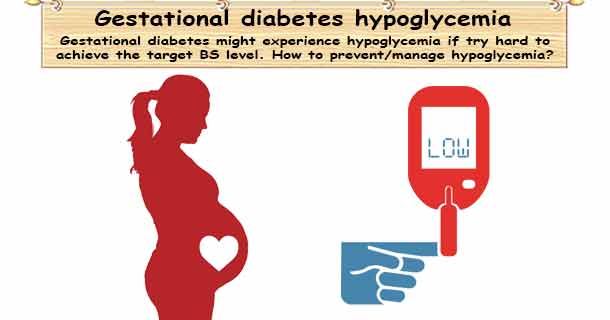Gestational diabetes might experience hypoglycemia if they try hard to achieve the target blood glucose level. Learn how to prevent/manage hypoglycemia.
Gestational Diabetes Hypoglycemia Management
What is gestational diabetes hypoglycemia?
Hypoglycemia is a condition characterized by low blood sugar (or glucose) in gestational diabetes patients.
What causes hypoglycemia?
Treatment with Insulin or glyburide may increase the risk of hypoglycemia. Also, overtreatment might cause low blood glucose.
What are the symptoms of hypoglycemia?
Symptoms of hypoglycemia are:
- headaches (or dizziness),
- hand tremors,
- sweating,
- palpitations,
- nausea,
- hunger,
- fatigue,
- headache,
- mood swing,
- irritability,
- attention problem, and
- tingling sensation (mouth or lips) or abnormal discomfort.
Severe hypoglycemia symptoms are:
- confusion,
- abnormal behavior,
- visual disturbances,
- nervousness, and
- anxiety.
Other uncommon hypoglycemia symptoms are seizures and loss of consciousness.
It is important to recognize hypoglycemia symptoms and treat them immediately to avoid complications.
How is hypoglycemia diagnosed?
Confirm hypoglycemia in gestational diabetes when the blood glucose level of less than 70 mg/dl.
How is hypoglycemia treated?
Drink three teaspoons of glucose powder (i.e., 15 to 20 grams) dissolved in a glass of water. If glucose is not available, take sugar (6 teaspoons) or honey in a glass of water or fruit juice/honey/anything which is sweet/any food.
After drinking oral glucose, you must take rest & avoid physical activity.
Fifteen minutes after taking glucose, you must eat any food or a glass of milk.
If hypoglycemia continues, repeat the same amount of glucose and wait for the blood glucose to normalize. Take rest, eat regularly, and check blood glucose if possible.
If you develop more than one episode of hypoglycemia in a day, you should consult a doctor immediately.
Furthermore, at pre-exercise, the blood glucose level is ≤ 4.0 mmol/L is considered as low and exercise until taking some prolonged and short-acting glucose in food or drink.
How can I prevent hypoglycemia?
Food – A missed, delayed, or small meal. Eat all your meals and snacks on time in the right quantity & quality.
Exercise – Excess exercise can use up your blood glucose. If there is insufficient glucose in your body, you may become hypoglycemic. Eat extra food to match your increased activity.
Medication – Overdose of insulin. Take only the de that has been prescribed in time. Also, consult your doctor if there is any need to modify the treatment.
Alcohol – Alcohol intake, especially on an empty stomach. Caution: Alcohol s not recommended during pregnancy.
Newborn Hypoglycemia
What is newborn hypoglycemia?
Neonatal hypoglycemia is characterized by a plasma glucose level of less than 30 mg/dL (or 1.65 mmol/L) in the first 24 hours of birth and less than 45 mg/dL (or 2.5 mmol/L) hereafter.
What causes hypoglycemia in newborn?
Babies born to a gestational diabetes mother are at risk for developing hypoglycemia, whether they are on insulin therapy or not. So all gestational diabetes mother’s babies should be checked for hypoglycemia within one hour of birth.
What are the symptoms of newborn hypoglycemia?
The new-born baby may not have any symptom of hypoglycemia. Some common hypoglycemia symptoms of a newborn child are:
- Stupor (a state of near-unconsciousness),
- Tremors, limpness (lacking stiffness or firmness),
- lethargy,
- bluish skin due to poor circulation or inadequate oxygenation of the blood,
- convulsions; a sudden, violent, irregular movement of the body, caused by involuntary contraction of muscles,
- intermittent apneic (suspension of breathing),
- tachypnea (abnormally rapid breathing),
- weak high pitched cry,
- difficulty in feeding,
- eye-rolling, and
- sweating episodes
How is hypoglycemia diagnosed in a newborn?
Hypoglycemia in the newborn is a plasma glucose level of less than 30 mg/dL (or 1.65 mmol/L) in the first 24 hours of birth and less than 45 mg/dL (or 2.5 mmol/L) after that.
Glucose oxidase by calorimetric is a reliable hypoglycemia diagnosis procedure.
How is hypoglycemia treated in a newborn?
Immediate breastfeeding is the best treatment for neonatal hypoglycemia. If the infant is unable to suck, expressed breast milk from the mother should be given. If the mother is not able to breastfeed or no milk secretion, then the baby should be given any formula feed.
Recheck blood glucose after one hour of feeding. If the blood glucose is more than 45 mg/dl, continue 2 hourly breastfeedings.
How can I prevent hypoglycemia in newborn?
Since the fetus is receiving more blood glucose than required from the gestational diabetes mother. This excess blood glucose causes the baby's pancreas to make extra insulin to get rid of the blood glucose. Right after the baby is born, the blood glucose level may drop very low (hypoglycemia) because they have so much insulin in their bodies.
To prevent hypoglycemia in newborn, the gestational diabetes mother should maintain her blood sugar near the normal range.

